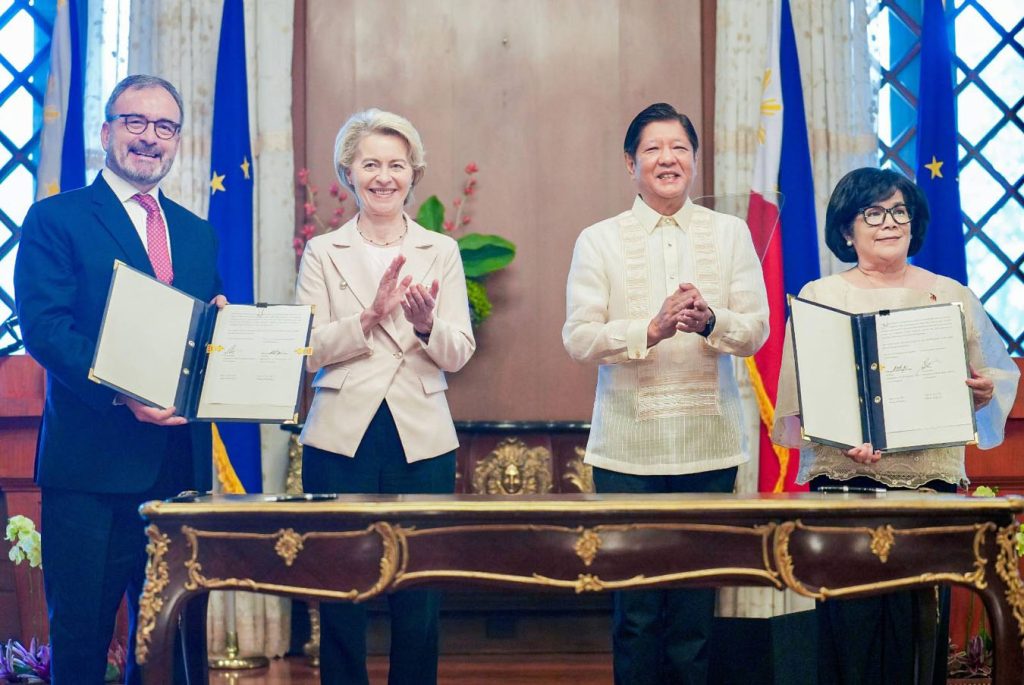
The Philippine government and the European Commission affirmed on Monday their commitment to strengthen bilateral relations by sustaining the government’s transition to green economy.
President Ferdinand R. Marcos Jr. said that his meeting with European Commission President Ursula von der Leyen was very productive as both parties have reached significant agreements, one of which is to strengthen the Philippine government’s transition to a green economy through the Green Economy Programme in the Philippines (GEPP).
The GEPP is a flagship project of the European Union’s (EU’s) Global Gateway.
“On the development cooperation, we committed to conclude an agreement on the Green Economy Program in the Philippines, a grant worth 60 million euros, which aims to support the Philippines in areas such as circular economy, renewable energy, and climate change mitigation,” President Marcos said.
During the EC President’s visit, a Joint Declaration on the Green Economy Programme was signed by EU Ambassador Luc Veron, head of the delegation of the European Union to the Philippines, and Environment and Natural Resources Secretary Maria Antonio Yulo-Loyzaga in the presence of President Marcos and President von der Leyen.
Both sides have agreed to sign a Financing Agreement “in the near future” to formalize the cooperation on GEPP, subject to the completion of the necessary internal approvals required by both Philippine government and the EU Commission.
Through the GEPP, the two sides have agreed to sustain green infrastructure development, trade, investments, including private sector engagement in green and sustainability measures in urban areas and micro, small and medium enterprises (MSMEs) in the country.
The GEPP will “support the Philippines’ transition to green economy by mobilizing additional funding from European Union Member States, European Financial Institutions, and the European private sector to support the Green Economy Transition, while generating local value, quality and decent jobs, and lasting growth.”
To implement this, both the Philippine government and the EU Commission also agreed to sustain technical education and skills development to enhance human capital and build a skilled “green” workforce capable of driving sustainable development in the Philippines.
Moreover, initiatives on capacity-building for Philippine institutions, including local government units (LGUs), to enhance governance and institutional capacities in implementing policies and programs supporting the green economy will likewise be pursued.
Both sides also agreed on sharing information on best practices and innovations towards improving resource use efficiency, minimizing waste generation, and scaling up renewable energy and energy efficiency.
The joint declaration added that there should be “investments in climate change adaptation, mitigation and environmental protection measures, including development and transfer of green technologies and innovations,” among other relevant cooperation areas which may be later agreed upon.
“Towards this end, the European Union will provide grant support in the form of technical assistance as deemed necessary to support the implementation of the GEPP, small-scale grants (to civil society organizations, business associations and incubators), equipment and infrastructure,” the joint declaration read.
The joint declaration also stated that the EU will share information, through its knowledge sharing programs and learning visits, to facilitate the transfer of technical expertise and best practices.
“Initiatives under GEPP will ensure inclusivity and promote gender equality, and seek to empower people living in vulnerable conditions,” the declaration added.
Both parties clarified that the Joint Declaration “is not meant to constitute and international treaty nor create any rights and obligations under international law.”
“Both sides, however, may regularly exchange opinions on the realization of the intent of this Joint Declaration, and work towards the completion of their respective approval and other processes, in accordance with existing laws, rules and regulations,” it stated, adding that “any dispute in the Joint Declaration will be settled amicably through consultations.” PND
